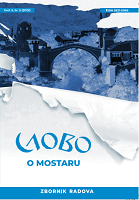„MOSTAR - LA - MORTE“ – POGLED NA MOSTAR U PUTOPISU HERMANNA WENDELA
“MOSTAR-LA-MORTE” - MOSTAR IN THE TRAVELOGUE OF HERMANN WENDEL
Author(s): Ajdin MuhedinovićSubject(s): Cultural history, Local History / Microhistory, Political history, Social history, Sociology of Culture, 19th Century, Sociology of Literature
Published by: Fakultet humanističkih nauka, Univerzitet »Džemal Bijedić« u Mostaru
Keywords: Hermann Wendel; Bosnia and Herzegovina; Mostar; Muslims; travelogue; culture; perception;
Summary/Abstract: his paper presents Wendel’s perception of these areas with a focus on Mostar and points out certain speciics of this travelogue. he main feature, or rather the diference, of his perception of this area and society, concerning travel writers who previously passed through Bosnia and Herzegovina and wrote about it, is that Wendel is extremely critical of the Austro-Hungarian administration over Bosnia and Herzegovina and sees the main problem that has led not only to the poor economic situation but also to the gradual disappearance of the oriental character of the cities of Bosnia and Herzegovina in which only fragments of the Orient can be found. Wendel’s conclusions are, in essence, just a way for the author to argue his political and ideological thesis that the South Slavs should develop independently in their common state which is inevitably part of Europe and which will continue to develop in the future following general courses of European development. In all this, Wendel sees Bosnia and Herzegovina exclusively as a colony and a failed project of Austro-Hungary, a country whose resources have not been used properly and to which the forty-year rule of a Western empire has not brought anything particularly good. He argues that he compared certain segments of development with the Kingdom of Serbia. When it comes to Wendel’s vision of Mostar, for him it is a city without a future, which was destroyed by the wrong Austro-Hungarian economic policy in this area. From Wendel’s travelogue we can learn something about the attitude of the people towards the Austro-Hungarian occupation and the government or the way of life in Mostar, but not too much. He mostly refers to the Muslim population, and his perception of it contains a number of common orientalist stereotypes. However, he bases his image of the dying city on the economic image of the city and the lack of suicient economic potential to change signiicant things in Mostar.
Journal: Slovo o
- Issue Year: 5/2022
- Issue No: 5
- Page Range: 247-263
- Page Count: 17
- Language: Bosnian

